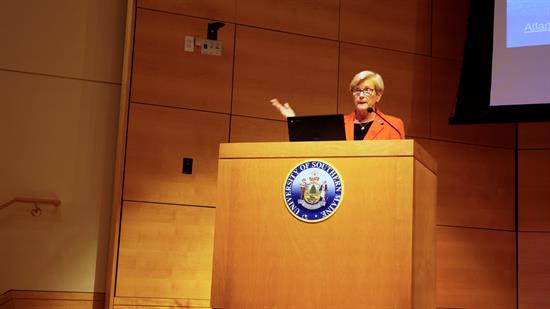Press Releases
Remarks as Prepared for Delivery by Rep. Chellie Pingree at NOAA Maine Lobster Hearing
Portland, Maine,
October 5, 2022
Assistant Administrator Coit and the others who are here with us tonight from NOAA Fisheries, thank you for responding to the request of our delegation and the Governor and coming to Maine to hold this meeting. I am Chellie Pingree, I represent the First Congressional District which includes the coastal and island communities from Kittery to Camden. My own home is on an island 12 miles off the coast, accessed by an hour-long ferry ride. It is one of several islands in in Penobscot Bay – the heart of lobster fishing territory and perhaps the site of the largest landings in the world. Living in a fishing community, you are never very far removed from the challenges the men and women who fish for lobster experience. For 150 years, the Maine lobstering industry has adopted practices to sustain this fishery – and it has continued to support sustainable practices like v-notching females, trap limits, and a fishery based on owner operated boats. Starting in 1997 it has adopted practices to protect right whales. According to NOAA Fisheries’ own data, these practices have worked: the Maine lobster fishery hasn’t been definitively linked to an entanglement in 20 years. In 2010, a significant shift occurred in the right whale’s migration pattern. This shift was later explained by Bigelow Laboratory research, which found warming deep water temperatures changed the location of whales’ key food source and therefore where they traveled and fed. Research showed whales were drawn out of Maine waters, leading to an uptick in deaths from ships strikes and entanglements in Canadian waters. Nevertheless, the Maine lobster industry has been forced to make dramatic changes and shoulder the cost of reducing right whale deaths—regardless of whether the right whale deaths can be linked to lobstering in the Gulf of Maine. From Kittery to Calais—all 3,478 miles of our coastline—the lobster fishery impacts nearly every coastal community. Commercial fishing licenses are held in every island and coastal town—accounting for about 6,000 jobs on the water. In 2021 the landings were worth about $725 million but this fishery contributes about $1.4 BILLION to state’s economy each year. In my community, like so many others, the lobster fishermen and their families represent our history, and their lives and activities are woven into the fabric of who we are. They’re our friends and neighbors and valued community members who are raising families, serving on the local school board, volunteering for the fire department. If lobstermen and women are forced to comply with new regulations that make it impossible to continue fishing, then many coastal businesses will also be impacted, and many won’t survive. In my own daughter’s pizza restaurant, Calderwood Hall, the Fishermen from Stonington and Vinalhaven bring their families over in their boats and fill up the tables, heading home when they’re full. It would seem empty without them. But it wouldn’t be just one empty restaurant. This would have a devastating impact on coastal and island year-round communities throughout our state. The businesses that support our daily lives—the grocery store, the boatyard, the gas station—would struggle to stay open. Families moving away and the decline in students may mean our schools have to close, and we’d seen the end of our clinic, the church and all the things that bind us together. Let me close with this: I urge you to recognize the impact these proposed conservation measures will have on our lobstermen, our coastal communities, and the entire state of Maine. There is no reason to create a new regulatory framework that will not provide additional protections for right whales—but potentially has the impact of shutting down the entire lobster industry. We are here today to ask you to prevent that from happening. Thank you.
### |

